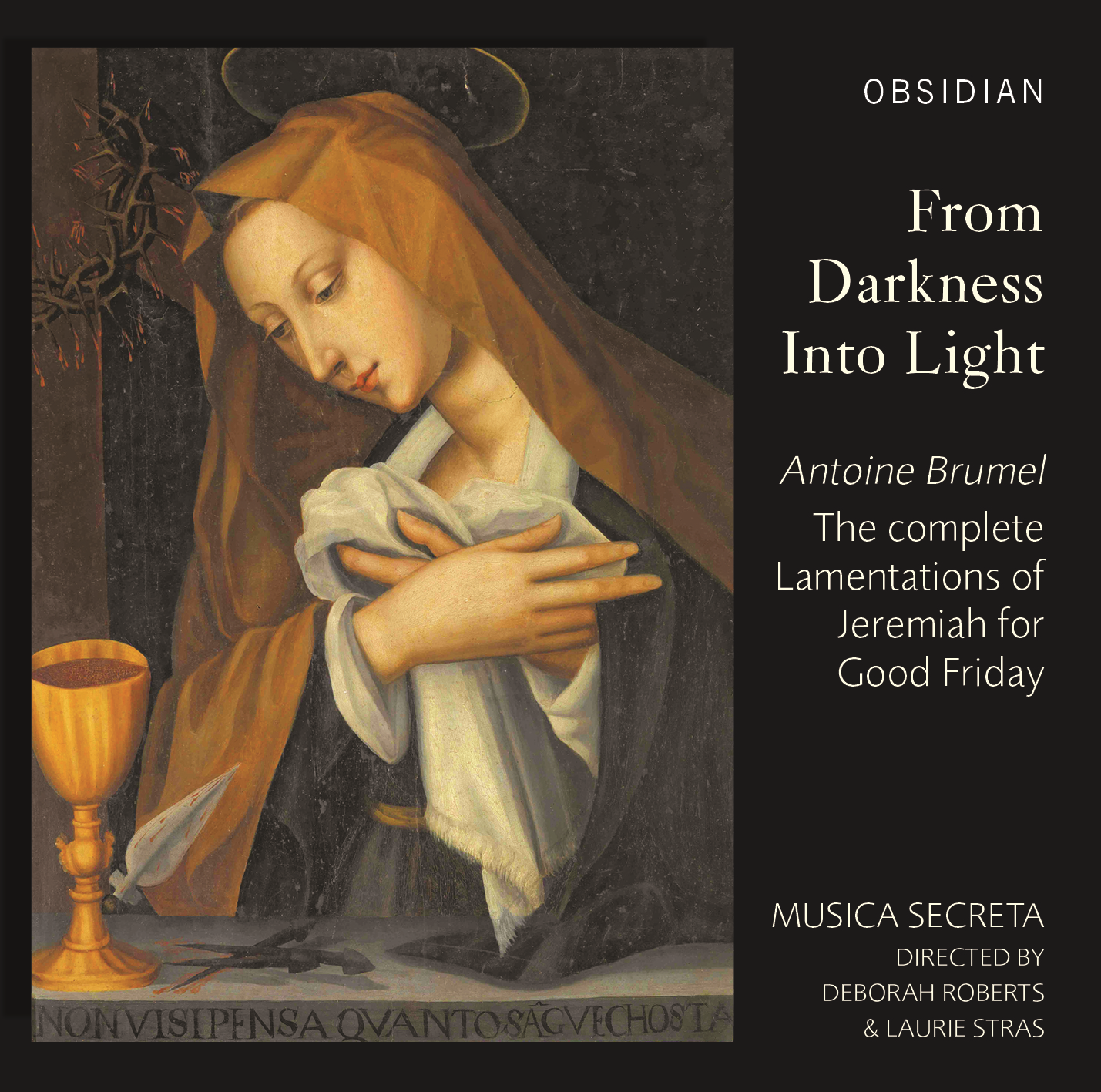medieval.org | obsidianrecords.co.uk | musicasecreta.com
Obsidian 719
Release: 1st Nov 2019


From Darkness into Light —
Musica Secreta
Antoine Brumel | The Complete Lamentations of Jeremiah for Good Friday
[1.12.2019]
medieval.org |
obsidianrecords.co.uk |
musicasecreta.com
Obsidian 719
Release: 1st Nov 2019


Musica Secreta, the UK’s premier
female-voice early music ensemble, releases a new recording based on a
major new discovery, the complete setting of the Lamentations of
Jeremiah for Good Friday by Antoine Brumel, one of the most celebrated
composers of the Renaissance.
Brumel’s Lamentations have been known,
performed, and recorded for many years in a much abbreviated form of
two verses and the refrain, “Jerusalem, convertere." The
additional seventeen verses, which which were found hiding in plain
sight in a sixteenth-century manuscript by Musica Secreta’s
co-director Laurie Stras, reveal a monumental setting that is both
intricate in its detail and imposing in its formal construction; a
masterpiece brought from darkness into light.
This complete set of Brumel’s Lamentations
was preserved for centuries in a manuscript that was not copied for
display, nor for a great noble chapel; it has no illuminations, and
virtually no composer ascriptions to lead the curious towards its
musical treasures. But its copyist, an obscure friar, was a different
kind of master, leaving tiny details in the decorations that leap out
at the reader like direct messages from the past. He left another
manuscript, copied for a Florentine convent, that is filled with tiny
inscriptions and portraits of the nuns, and the music it contains gives
us a similar aural portrait of the nuns’ daily life. The second
half of the disc brings the music of this second manuscript into focus,
with gems by Josquin des Prez and Loyset Compère sitting
alongside the anonymous beauty of works that decorated the nuns’
worship throughout the year.
[1.12.2019]
medieval.org Remarks
http://www.medieval.org/emfaq/cds/remarks.html
20 November 2019
Todd M. McComb
———
Another new musical discovery from the era (returning to last
week's entry on the Leuven Chansonnier
as a touchstone) is the complete Lamentations by Brumel,
which musicologist Laurie Stras apparently stumbled upon recently
in a library in Italy.
Stras is associated with the ensemble Musica
Secreta, which I remember from e.g. their
Luzzaschi program of almost twenty years ago, but they've
remained active, mostly around Renaissance or Baroque repertory
associated with women & in Italy. Their new program, focusing
on c.1500 Franco-Flemish polyphony, From
Darkness Into Light, thus seems like something of a departure,
although it also concerns Italian sources. In fact, the interpretations
of these works are appealing, projecting an almost Italianate
lightness that can seem dance-like at times, yet rejecting an
"angelic" sort of vocal presentation.
(And note that any
potential incongruity between lamenting & dancing is answered
by various traditional funerary dances around the world. It's not
that human movement is antithetical to mourning, then, but about
the sort of movement involved....)
There's also support for lower
parts from the organ, but this doesn't interfere with textural
clarity. And while the other brief pieces have their interest, the
impetus for the album was obviously the Brumel, which had previously
existed in only a much shorter version: These Lamentations
appear to herald the upcoming Italian madrigal, forging a "sacred
drama" presented in "acts" rather than a liturgy
oriented on ritual performativity. The result thus continues to
mark Brumel as anticipating later developments, here in a highly
motivic proto-"operatic" sort of work (that could be seen
as completely refiguring the medieval passion play — although
Brumel probably never knew such music).
And although the glimpse
(& accomplishment) of later sixteenth century style here isn't
a priority for me, there's little doubt that this signature work
can become relatively popular, particularly among people who value
notions of "Renaissance" far more than they do the
pre-modern per se.... Whereas Brumel already had such a reputation,
it's perhaps (now) most strongly illustrated by this impressive
cycle.
[1.12.2019]